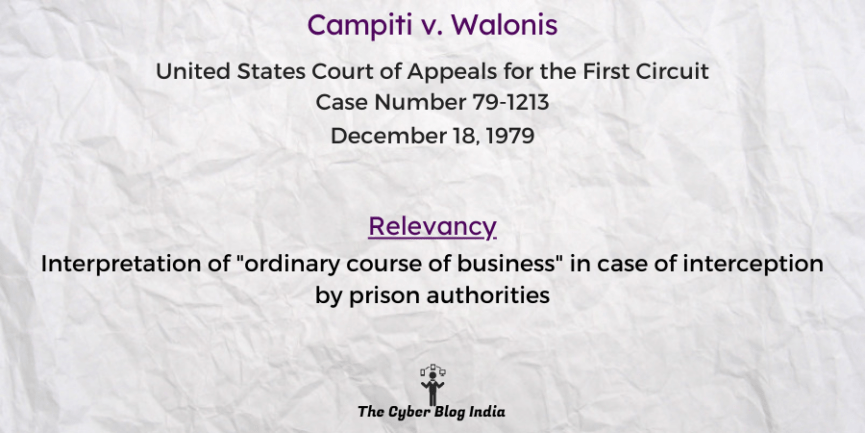Campiti v. Walonis

Campiti v. Walonis
611 F.2d 387 : 58 A.L.R.Fed. 579
In the United States Court of Appeals for the First Circuit
Case Number 79-1213
Before Chief Judge Coffin, Circuit Judge Campbell, and Circuit Judge Bownes
Decided on December 18, 1979
Relevancy of the Case: Interpretation of “ordinary course of business” in case of interception by prison authorities
Statutes and Provisions Involved
- The Omnibus Crime Control and State Streets Act, 18 U.S.C § 2510-2520
Relevant Facts of the Case
- The plaintiff was an inmate at a House of Correction. The allegations state that he received favourable treatment, such as work release privileges from the Sheriff. Therefore, he was transferred to another location in a maximum-security unit.
- Thereafter, he requested to talk to the said Sheriff. The defendants agreed to monitor the plaintiff’s call using an extension telephone wired into the main switchboard.
- The prison officer went outside the room after the plaintiff initiated the call. He was aware that the call was already being monitored.
- Walonis, the first defendant, made handwritten notes of the conversation. The District Court held the defendants liable for non-consensual interception, and they have appealed this decision.
Prominent Arguments by the Counsels
- The defendants’ counsel argued that using an extension telephone in the ordinary course of business to intercept the call came under statutory exclusion. Since they acted in good faith, the federal act and Massachusetts law are not applicable.
- The plaintiff’s counsel submitted that the court must note that the defendants did not take his consent before any such interception.
Opinion of the Bench
- The provisions of federal wiretapping laws aim to prohibit secret interception of wire communications. Hence, the equipment used is not relevant.
- The defendants’ interception does not fall within the ordinary course of business. The usual procedure is to comprehend the calls in the presence of an officer with the caller, and the interception of calls by the first defendant is an exceptional course of conduct.
Final Decision
- The Court of Appeals affirmed the District Court’s judgment.
